This post may contain affiliate sales links. Please read my disclosure policy.
Let’s talk about how to make a water bath for a cheesecake! They aren’t hard to set up and the extra step will give you a beautiful, creamy cheesecake free of cracks! Plus, I’ll share with you my tricks for no leaks!
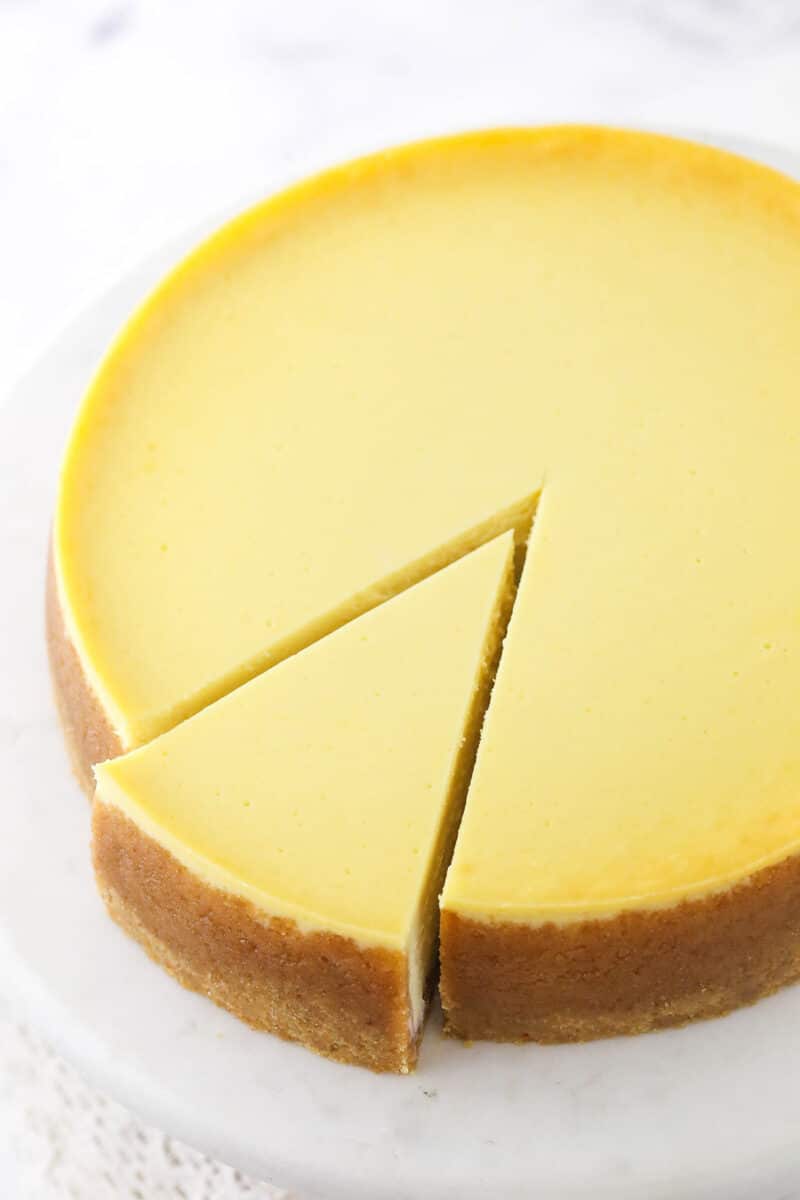
There’s no doubt that I’m a huge fan of cheesecake. The sheer number of cheesecake recipes on my site gives me away. I love the classics and I love unique twists. And with all the cheesecake baking I’ve done over the years, I’ve learned a lot and my number one tip for success is a water bath. If you want a beautiful cheesecake free of cracks, over-browned edges and a sunken middle, you need to use a water bath.
What is a Water Bath?
Cheesecake is basically a custard-based dessert and therefore needs to be treated differently. A water bath, also known as a bain marie, is our secret to the perfect cheesecake. It produces steam that wafts throughout the oven, helping to ensure that the cheesecake cooks evenly and stays nice and creamy. It also moderates the heat on the sides of the pan so that they edges don’t cook much faster than the center.
Why Use a Water Bath?
The benefits of a water bath are plenty. It gives you a cheesecake that:
- Is free of cracks.
- Doesn’t over cook or over brown on the edges.
- Doesn’t sink in the middle while cooking.
- Stays super smooth and creamy.
However, water baths can often be confusing, leak and generally be a pain. So I’m excited to share my methods with you today because they aren’t complicated, won’t leak and it is SO much better than not using a water bath. You spend so much time making a cheesecake – don’t skip this final step and end up with an underwhelming result.
What You’ll Need
I’m going to share a few ways of setting up a water bath. You have options! The first requires the least amount of equipment, but is most likely to leak. The other two will keep you leak-free and really depend on preference. Here’s what equipment you’ll need.
- Springform Pan: You’ll need a 9 inch springform pan for most recipes.
- Large Pan: “Large” is a little vague, but ultimately you need a pan larger than the springform pan that the water will actually go in. It can be a large roasting pan or a large cake pan (I use a 12 inch cake pan).
- Aluminum Foil: This is optional depending on the method you choose. I recommend to long, heavy duty foil.
- Slow Cooker Bags: These are optional depending on the method you choose, but can help prevent your water bath from leaking.
- Large Silicone Pan: This is also optional depending on the method you choose, but it is the easiest method and most likely to prevent leaking. You have to buy the pan, but if you bake a lot of cheesecakes, it will totally be worth it.
- Hot Water: To fill your larger pan.
How to Set Up A Water Bath
Setting up the water bath is a few step process. The wrapping of the pan happens after you bake the crust and adding the hot water happens just before you bake it.
- Make your crust: The first thing you need to do for any cheesecake is properly prep your pan and add your crust. I typically use a graham cracker crust or Oreo crust. I typically pre-bake my crust a bit.
- Prep your pan for the water bath: After you bake your crust, you can go ahead and prep your pan for a water bath using one of the 3 methods below. After prepping the springform pan, place your springform pan into the larger roasting pan or cake pan.
- Add cheesecake filling: Now you can make your cheesecake filling and add it to the crust.
- Add hot water: Bring your pan close to the oven so prevent moving a pan full of water all over the place, then add the hot water to the outer large pan.
- Bake cheesecake: Place your cheesecake and it’s water bath in the oven and bake as directed.
- Cool Cheesecake: When your cheesecake has baked, you can remove it from the water bath, but leave it in the springform pan. You can set the cheesecake on a cooling rack to cool to room temperature and then refrigerate it, or just place it straight in the fridge to cool completely. If you don’t want any condensation forming on top, let it cool to room temperature before refrigerating it.
Three Water Bath Methods
Method 1: Aluminum Foil
For this method, you’ll use aluminum foil around the outside of your springform pan. I’d recommend two or three layers to try to prevent leaking. You also don’t want to crinkle the foil too much at the bottom. It can cause little cracks to form in the foil, which can cause leaking. Leave it a touch looser around the bottom.
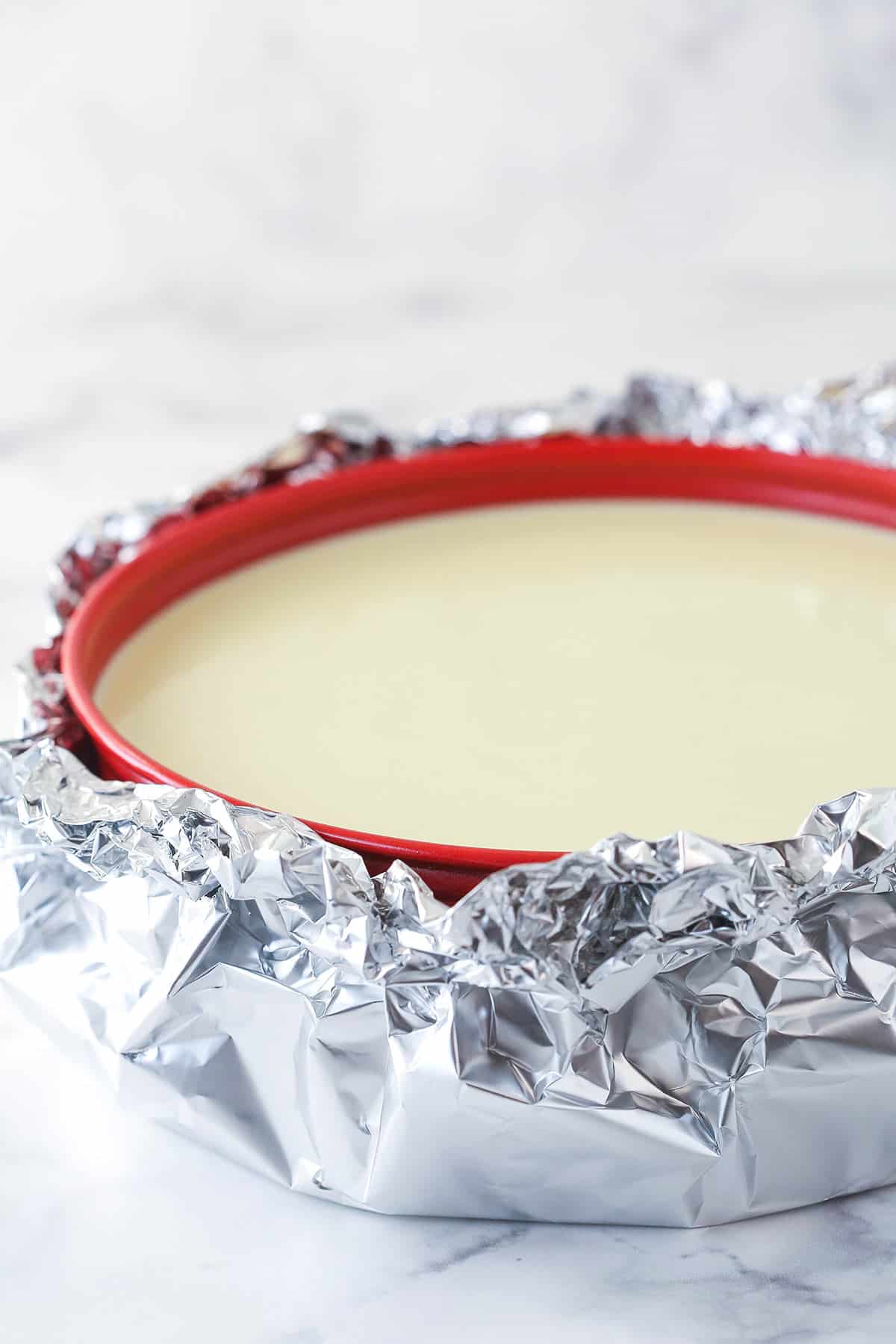
Set your foil-wrapped pan in your larger pan and fill the larger pan with hot water that comes about half way up the side of the springform pan. The water can boil a touch during baking, so you don’t want it to come up too high or the water could “jump” over the foil. Finally, bake your cheesecake according to your recipe.
Method 2: Slow Cooker Bags
I have been using this method for a long time. It was my original method for a leak-proof water bath and I’ve been doing this for years. Slow cooker bags can hold up to the heat and won’t form little holes or cracks, like aluminum foil. For this method, first wrap your springform pan in the slow cooker bag. The bag will be a little big, so tie a knot with the excess.
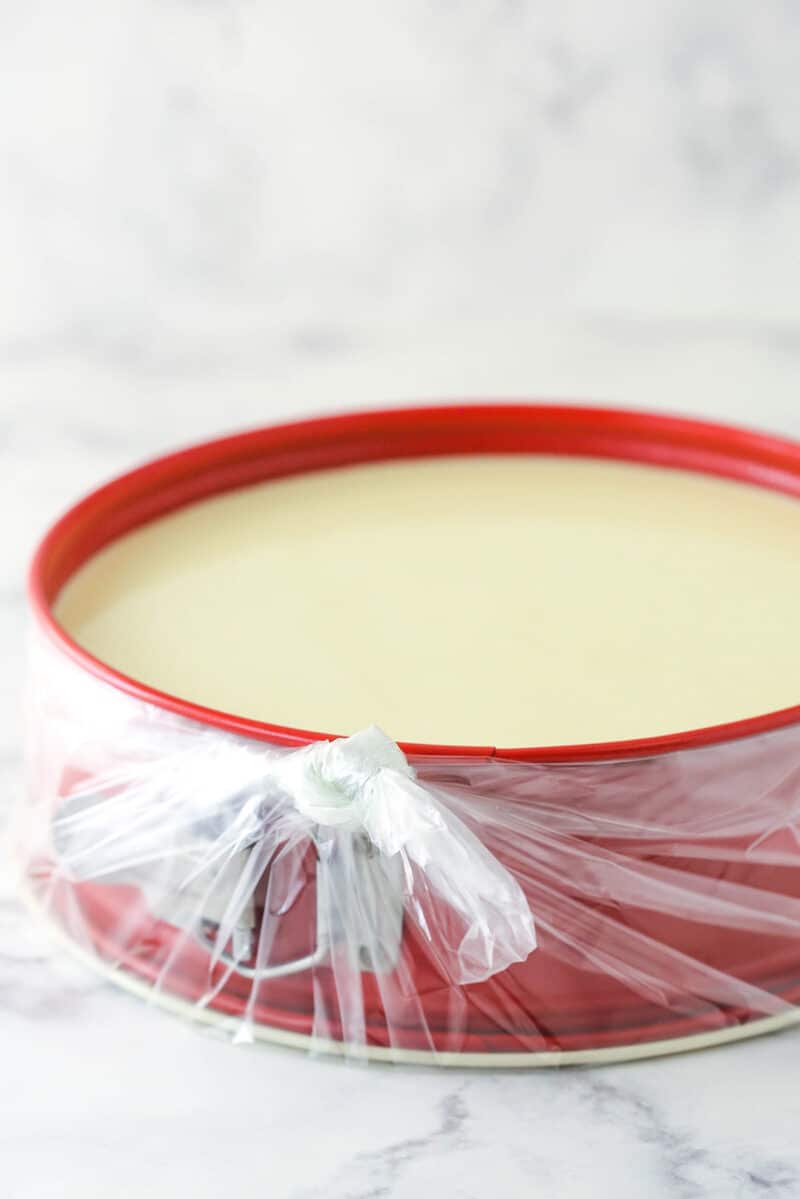
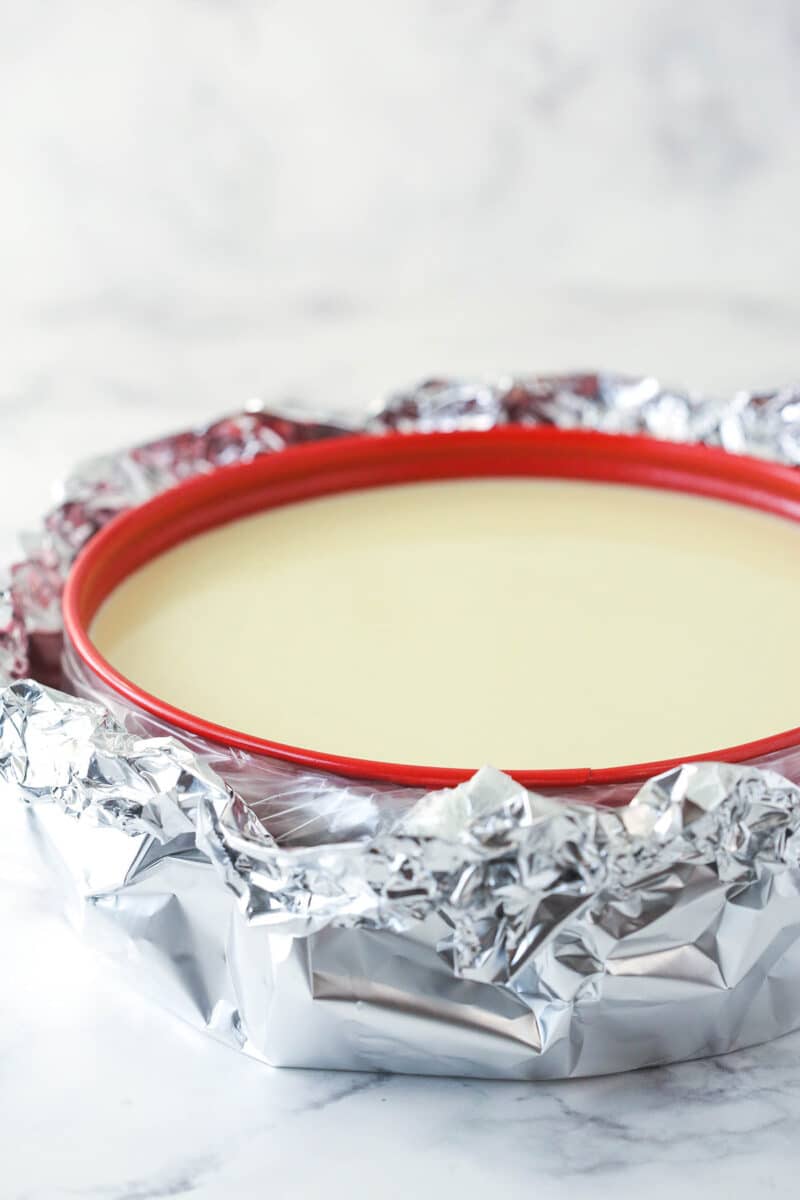
Wrap a layer of foil around the outside of the slow cooker bag, then place the pan in the larger pan. Fill the larger pan with hot water that comes about half way up the side of the springform pan, then bake your cheesecake.
Method 3: Silicone Pan
This is my most recent method. After getting a lot of questions about using a silicone pan in place of the slow cooker bag and foil, I decided to try it. I totally fell in love with this method! No need for wrapping and unwrapping, and no need to worry about leaking. Another plus is that the silicone pan is reusable so you won’t have to buy foil and bags over and over.
So for this method, just set your springform pan in the silicone pan. Place that into the larger pan that will hold the water, then add your hot water and bake. Just keep in mind that the water should only be about halfway up the sides of the silicone pan. You don’t want it to come up too high. The water could boil a touch while baking and you don’t want it to “jump” over the sides of the silicone pan and get into your crust.
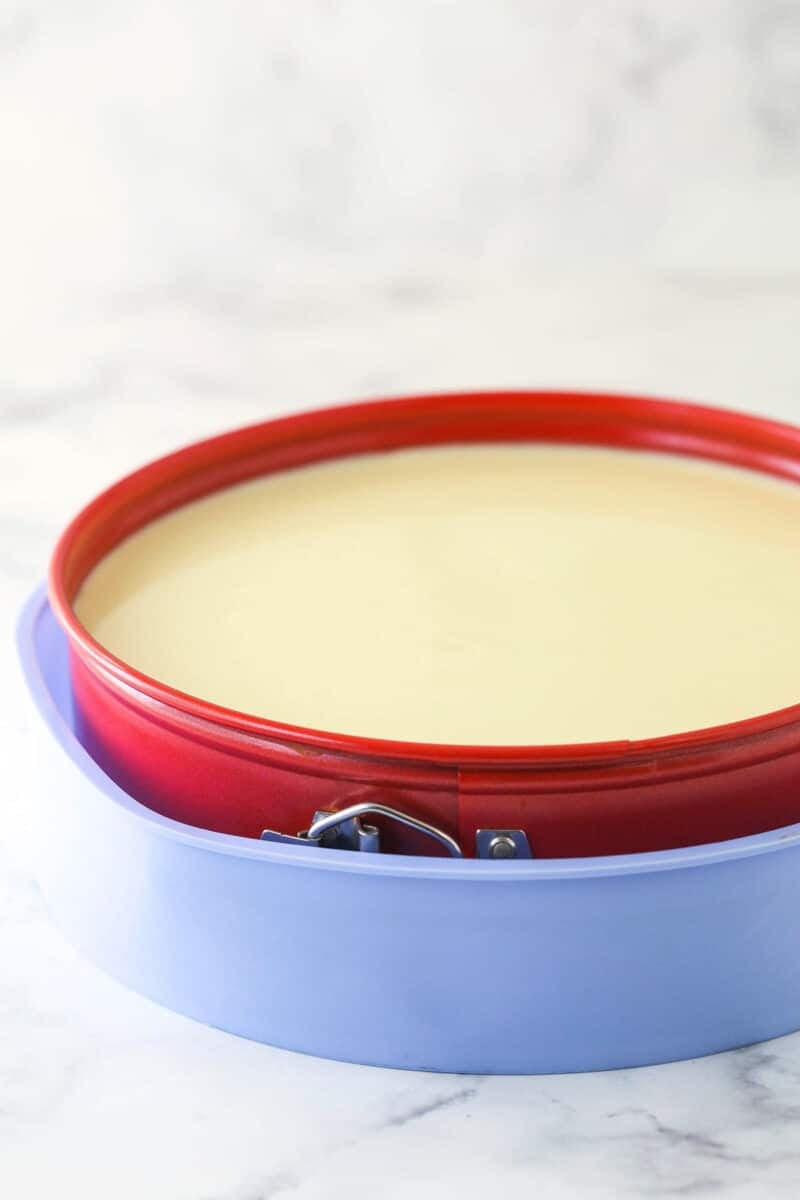
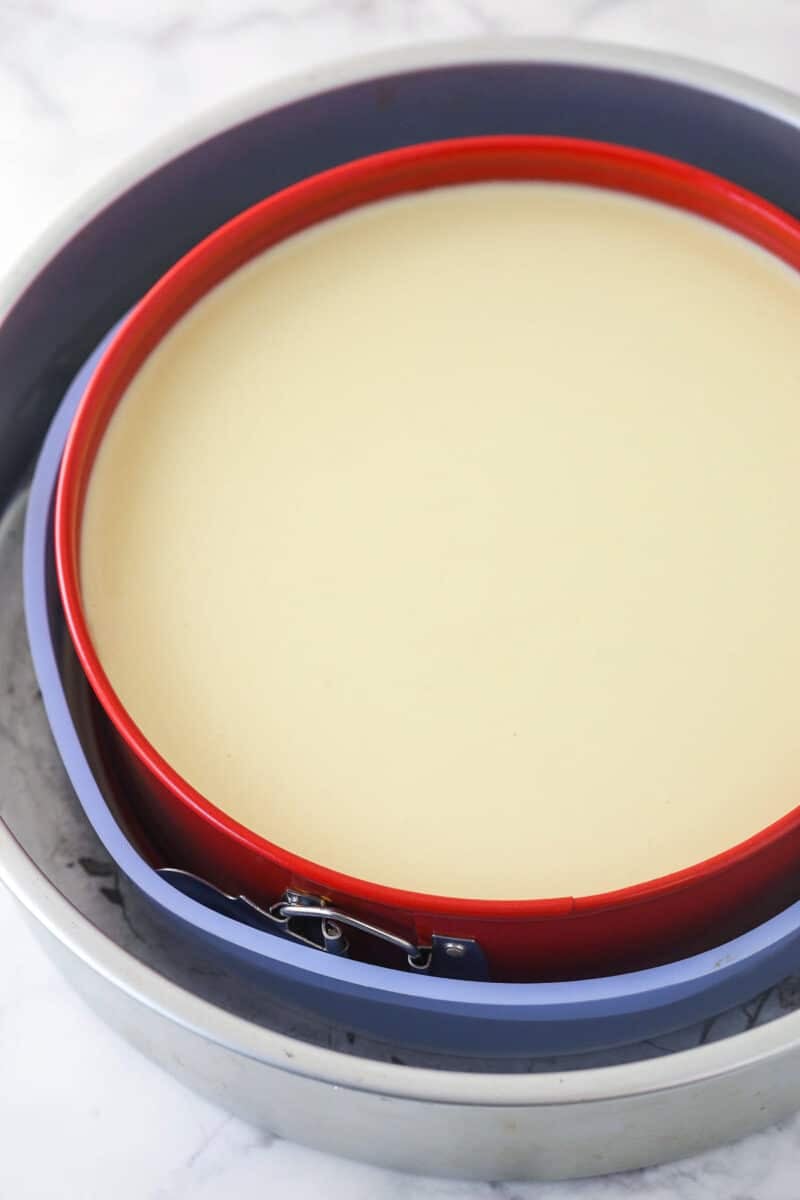
Compare: Cheesecake Baked With and Without a Water Bath
I’ve told you what happens when you bake a cheesecake without a water bath, and showed you how to set one up. Now let’s look at the final result with and without a water bath. Results could vary a bit between recipes (I used my Classic Vanilla Cheesecake), but this is generally what the difference looks like.
Cheesecake Baked with Water Bath
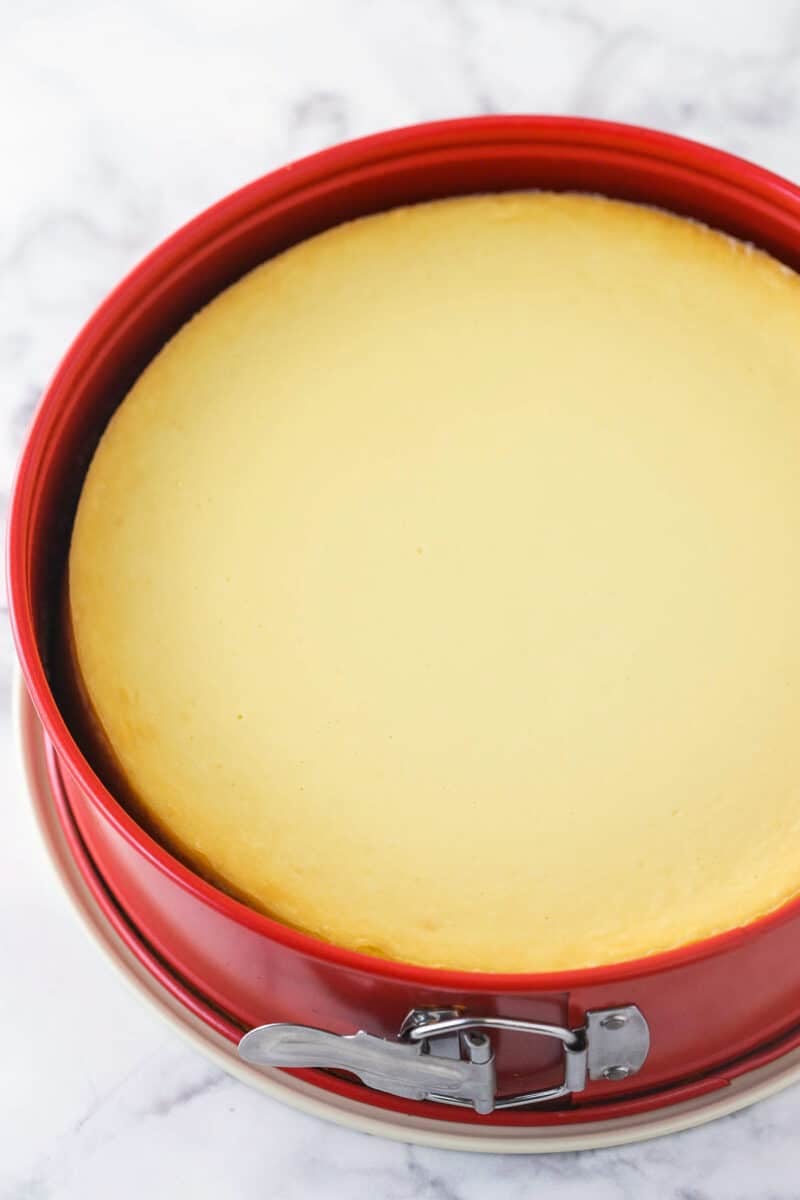
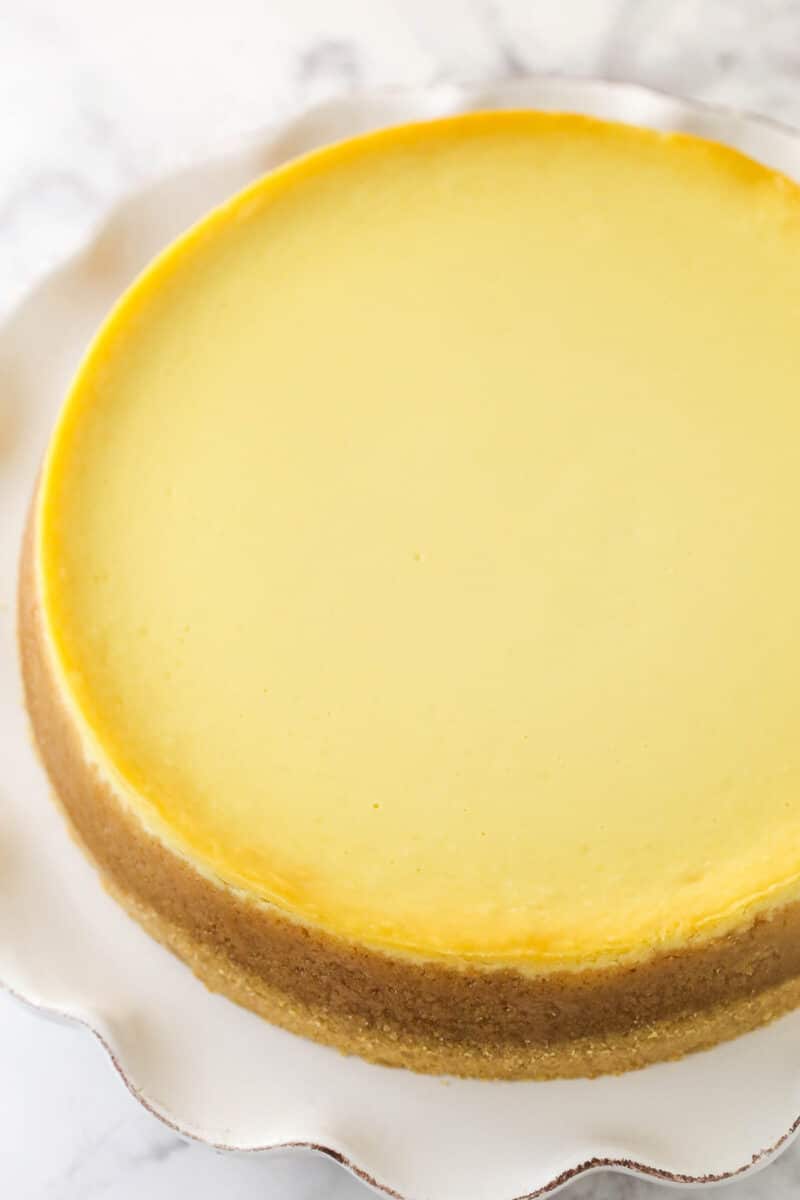
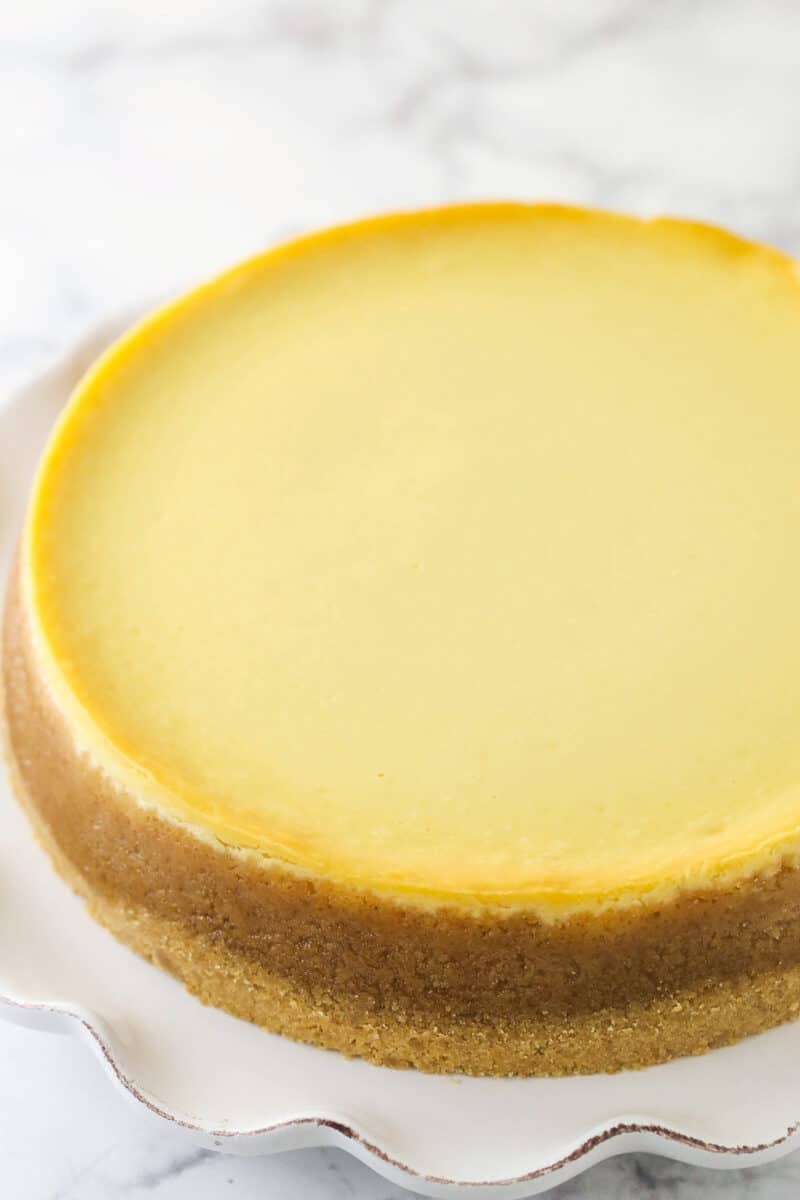
Cheesecake Baked Without Water Bath
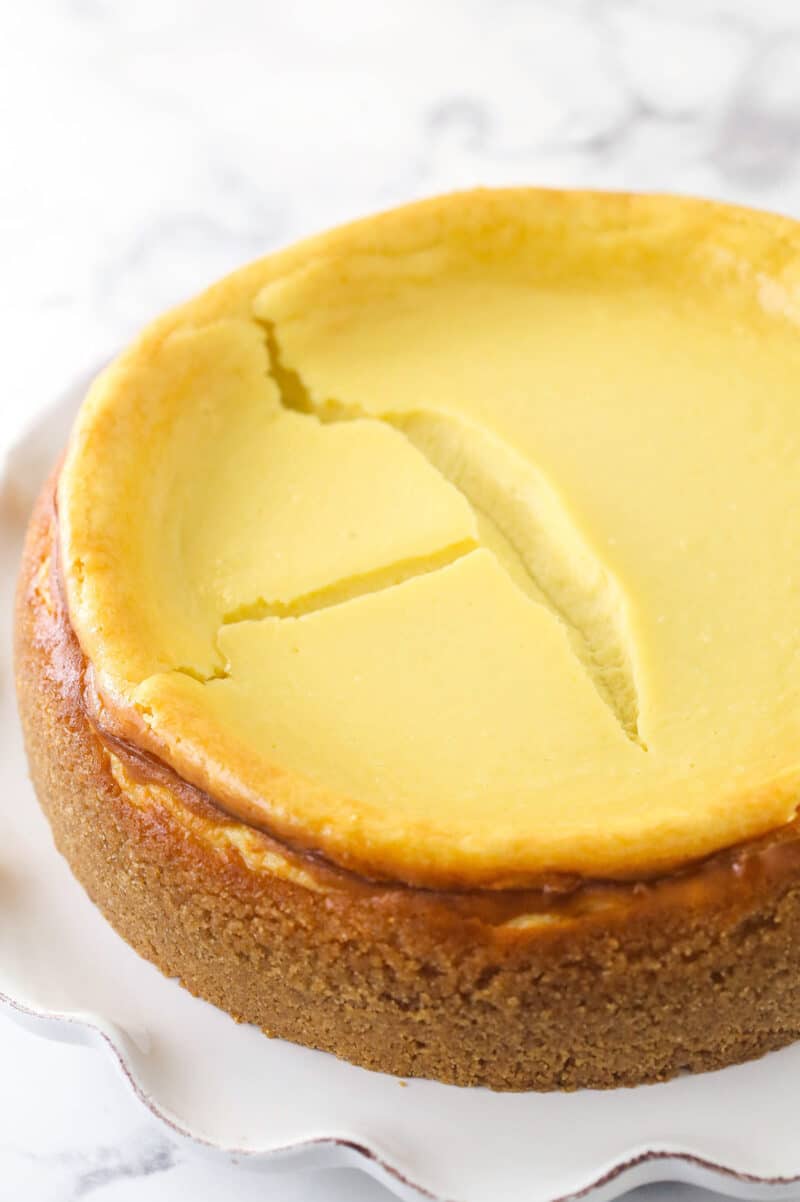
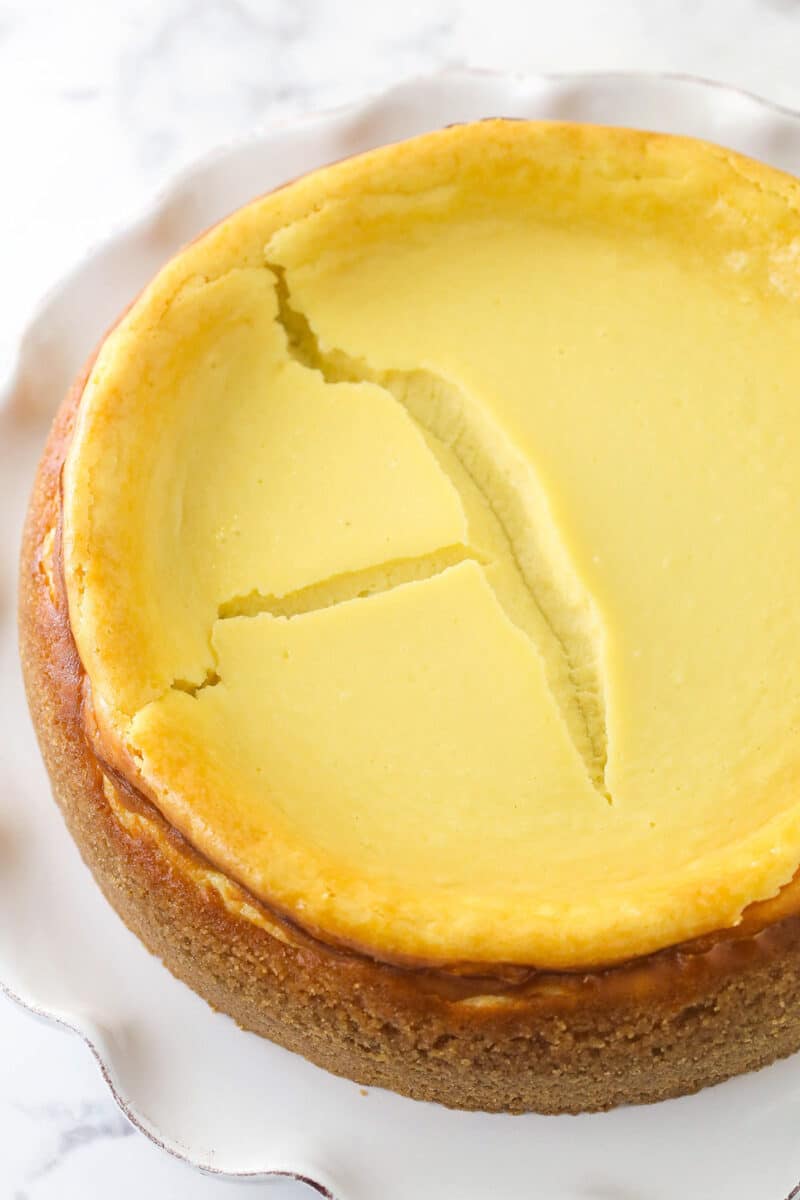
Can I Just Put A Pan Of Water On The Rack Below?
I get this question quite a lot, so I tested it. While your results may vary depending on the recipe, I found that the result was kind of in the middle. It still browned a little more than when you use a water bath and still fell a bit, which you can see in the sides, but otherwise it did well. It didn’t fall in the center and it didn’t crack. So if you’re really averse to using a water bath and don’t mind the slight imperfections, this would certainly be an option.
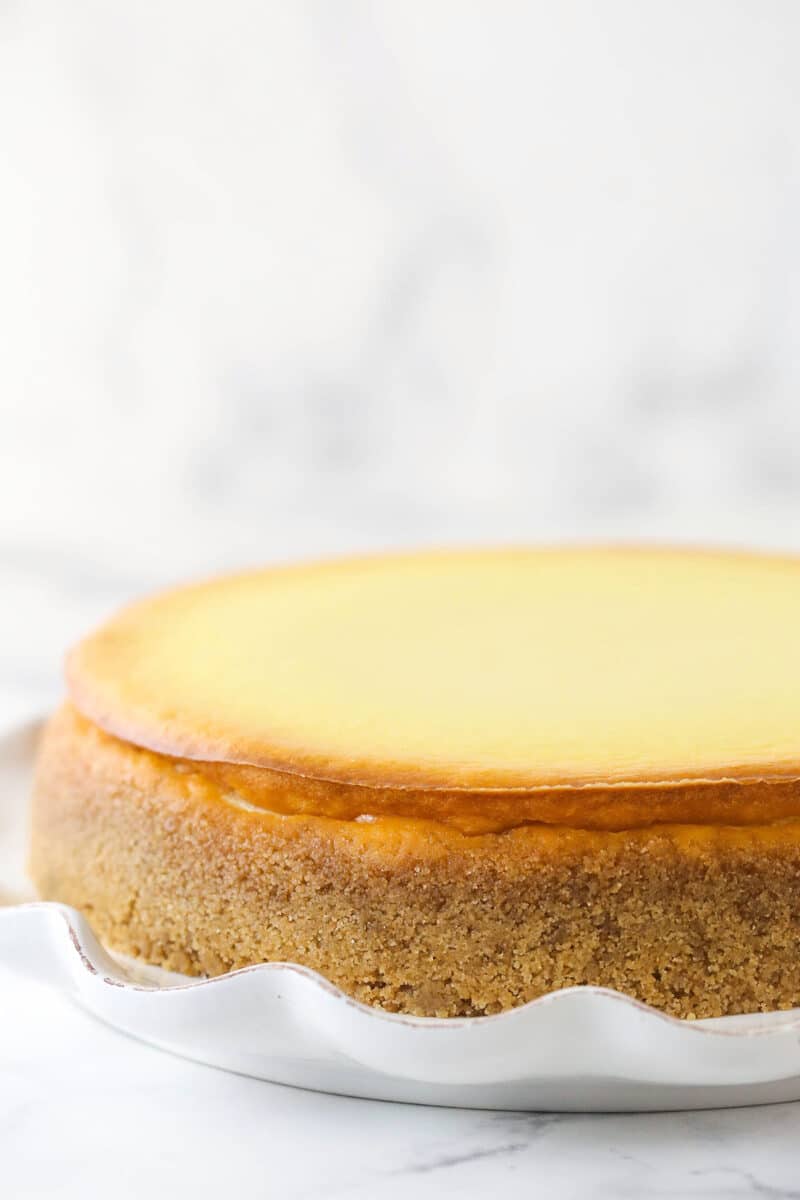
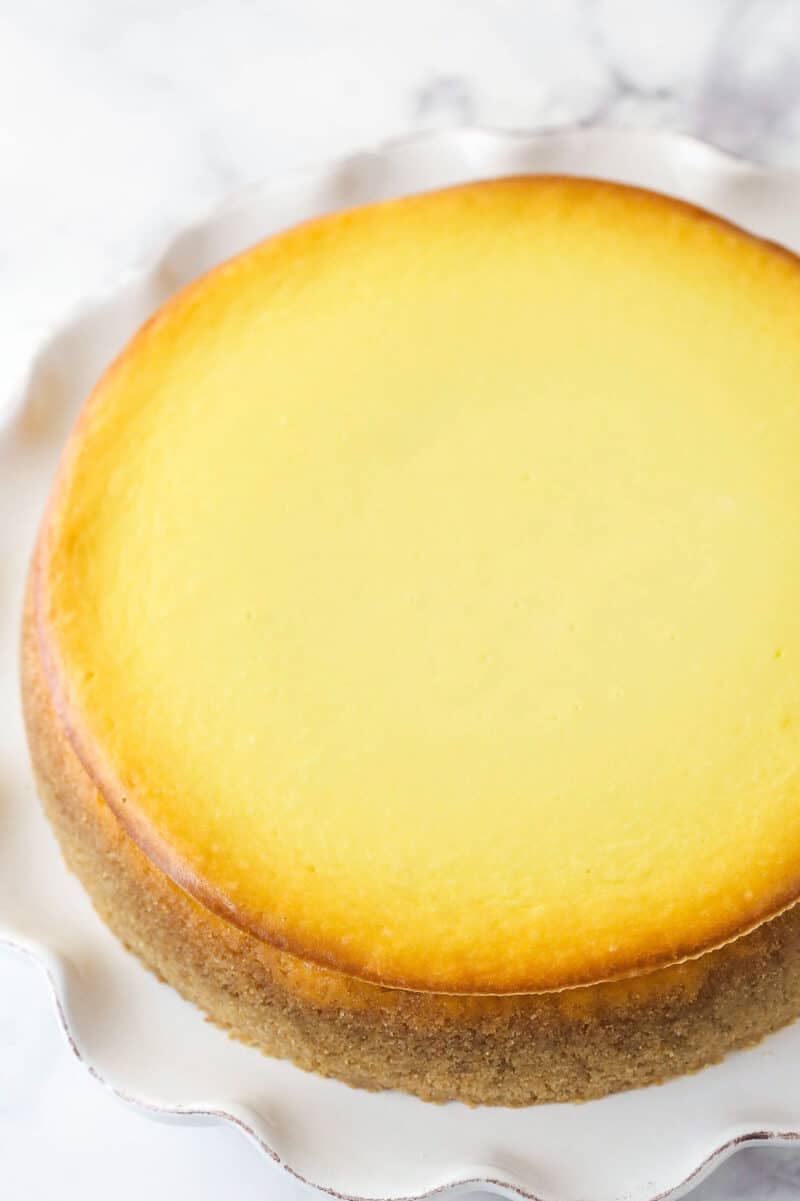
When do I NOT Need a Water Bath?
If you’re using a recipe that doesn’t call for one, then that should be fine. Mini cheesecakes also don’t require a water bath, nor do 9×13 cheesecakes. Their smaller and thinner size means they bake more evenly without having to use a water bath. And of course a no-bake cheesecake doesn’t need one either.
Pro Tips For a Great Cheesecake
- Don’t over or under bake your cheesecake. Check out my post on how to tell when your cheesecake is done baking.
- Add the water to your water bath pan with the pan near the oven. Trying to carry a heavy pan full of water and a cheesecake without it splashing around is not easy.
- Cool it slowly. All of my cheesecake recipes call for a two step cooling method that allows the cheesecake to bake fully while not over baking. It also helps to avoid cracking.
- Let your cheesecake chill and firm up before removing it from the springform pan. When you’re ready, check out my tutorial and video for how to remove a cheesecake from the springform pan.
- When you’re ready to store your cheesecake, check out my post on storing it, freezing it, etc.
- If you want to bake a cheesecake in a size other than a 9 inch pan, check out my guide to adjusting cheesecake sizes.
Now that you know how to do a cheesecake water bath, here are some amazing cheesecake recipes to try:
- Strawberry Cheesecake
- Best Oreo Cheesecake
- New York Style Cheesecake
- Dark Chocolate Cheesecake
- Turtle Cheesecake
- Cinnamon Roll Cheesecake
- Amaretto Cheesecake
- S’mores Cheesecake
- Mint Oreo Cheesecake
- Apple Cinnamon Cheesecake
- German Chocolate Cheesecake
- Red Velvet Cheesecake
- Caramel Apple Cheesecake
- Pumpkin Cheesecake
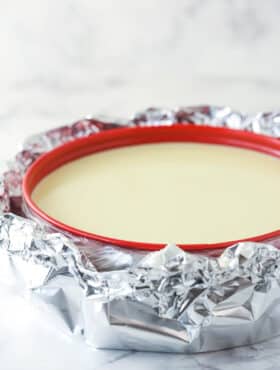
How to Bake Cheesecake in a Water Bath
- Prep Time: 45 minutes
- Cooling Time: 4 hours
- Cook Time: 2 hours 15 minutes
- Total Time: 7 hours
- Yield: 12-14 slices
- Category: Dessert
- Method: Oven
- Cuisine: American
Description
Let’s talk about how to make a water bath for a cheesecake! They aren’t hard to set up and the extra step will give you a beautiful, creamy cheesecake free of cracks! Plus, I’ll share with you my tricks for no leaks!
Ingredients
- Springform pan
- Aluminum foil, optional depending on method
- Slow cooker bags, optional depending on method
- Large silicone pan, optional depending on method
- Large pan (Like a roasting pan or a 12 inch cake pan)
Instructions
- Make your crust: The first thing you need to do for any cheesecake is properly prep your pan and add your crust. I typically use a graham cracker crust or Oreo crust. I typically pre-bake my crust a bit.
- Prep your pan for the water bath: After you bake your crust, you can go ahead and prep your pan for a water bath using one of the 3 methods discussed above. You can either: 1. Wrap your pan in two or three layers of aluminum foil, 2. Wrap you pan in a slow cooker bag and one layer of foil, or 3. Place your springform pan in a slightly larger silicone pan. Place your springform pan into the larger roasting pan or cake pan.
- Add cheesecake filling: Now you can make your cheesecake filling and add it to the crust.
- Add hot water: Bring your pan close to the oven so prevent moving a pan full of water all over the place, then add the hot water to the outer large pan.
- Bake cheesecake: Place your cheesecake and it’s water bath in the oven and bake as directed.
- Cool Cheesecake: When your cheesecake has baked, you can remove it from the water bath, but leave it in the springform pan. You can set the cheesecake on a cooling rack to cool to room temperature and then refrigerate it, or just place it straight in the fridge to cool completely. If you don’t want any condensation forming on top, let it cool to room temperature before refrigerating it.


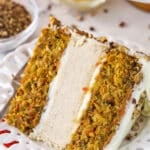
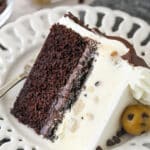


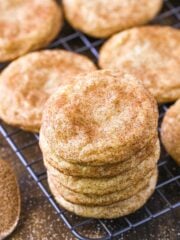
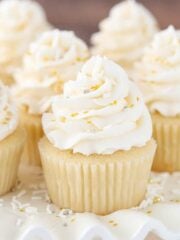
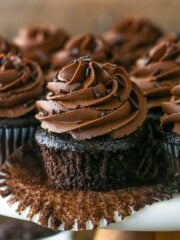

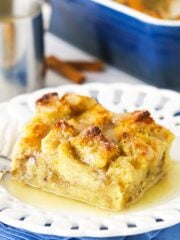
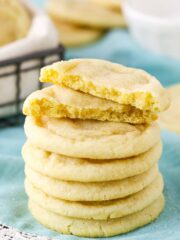
How do you get the bottom of the pan away from the cheesecake
I use parchment paper on the bottom of my springform pan help it not stick and then I run an offset spatula underneath the crust to help loosen it.
What a great idea! I use the slow cooker bags with my crock pot but never would have thought about this for a cheesecake! Awesome! Thank you. Going to try your Kahlua cheesecake soon!
Awesome! I hope you enjoy it!
I’ve now made both your banana pudding cheesecake and the banana Bavarian cream. They are both absolutely delicious. I am still having moisture issue using the water bath. I bought the bags suggested, had my husband tie the knot to have tight fit around springform pan. I also did two layers of heavy duty foil scrunched around the pan . I still had water in bottom of bag when I removed cheesecake. I have no idea what I’m doing incorrectly . My family loves these two recipes so I really want to perfect this prep work. Any ideas or suggestions would be so appreciative.
A couple things to keep in mind. Is the moisture actually getting inside the bag? Or are you just seeing condensation? If the bag is high enough on the sides of the cheesecake and the water level isn’t too high, water shouldn’t get in the bag unless the bag has a hole in it somewhere. Sometimes those bags have tiny little holes that are hard to see, but that’s not typical. Also for the foil, the more you scrunch it up tightly around your cheesecake, the more little cracks you get in the foil. It is actually best to scrunch it up as little as you can. If you continue to have trouble and would like to buy some thing, there are silicone molds you can buy on Amazon that you put your springform pan in and they keep water out without needing foil, etc. But you do need to make sure that the one you get is large enough for your particular springform pan. Some springform pans have a large lip on the outside at the bottom, which can make your mold not fit if it isn’t big enough.
Thank you so much for this pin… it’s very informative! I am a seasoned cook and I have never thought of this…mind blown 🤯
I wish you provided a link to your favorite cheesecake. And not necessarily the easiest recipe.
I have so very many cheesecakes that you can find here. Is the nearly impossible for me to choose a favorite because I love them all. If you would like a recommendation based on a flavor or event or something like that, let me know. https://www.lifeloveandsugar.com/recipes/sweets-and-treats/cheesecakes/
I prefer a video for the cannoli cheesecake as well 🙏🏻🙏🏻🙏🏻
Have you ever used gluten free flour?
I haven’t. You could try cornstarch in places of the flour as well.
I wish I had read this article before I baked my cheesecake, as water came through with one layer of foil.
I will purchase oven bags!
Thank you! After years of soggy bottoms, I had given up on water baths because it always leaked no matter how many layers of aluminum foil I used. Your idea made me immediately place an order for the bags as I’m making cheesecakes this weekend. I then remembered I had roasting bags in the cupboard and, lo and behold, the 8 pound roasting bag fits my 9 inch spring form pan perfectly. I just rolled the top edge down and put the foil over that. It turned out perfectly! Thank you so much for saving me from soggy bottomed cheesecakes! (Though my friends and family love to eat them anyway. Lol)
Awesome! I’m so glad it was helpful!
Hi! I keep reading that the slow cooker liners aren’t oven safe. Can you tell me which ones you use or just give me reassurance that they are oven safe? Lol. Thanks!
I’ve never read that before, but I can’t even count the number of times I’ve used them without an issue. They are the Reynolds brand.
Hi, I also have used the bags for years, but I always throw the bag away after the cheesecake is done. Have you ever tried reusing it again? It always seems like such a waste
Yes, I have a reused them before and it works well.
Well shoot, I just made your Funfetti Cheesecake with Cake Bottom for my daughter’s birthday and I am really worried it’s ruined because water got into it! Wish you had linked this one up to it. Maybe you can add it at the bottom of the recipe? Fingers crossed it turns out okay but I’m nervous since it is a cake layer and not a crust. Thanks for sharing your recipes!
Can I use ordinary binliners instead of the slow cooker ones? They are not for sale at the supermarkets and horribly expensive at Amazon. Without a slowcooker I would only need one for starters.
Bin liners as in trash bags? Trashbags are not oven safe and would melt.
Could you use a roasting bag? Also for the bin liner question, they sell the slow cooker liners, they do sell them at walmart, shoprite, and dollar general stores.
I don’t believe the roasting bags are big enough.
How much water do you add? Does the water need to go to the top of the inside pan?
You want it to go about halfway up the side of the springform pan.
Thank you Lindsey. I feel encouraged and ready for this. Thank you
Thank you
I’m going to try making this cheesecake 2 days before Christmas 2021 I pray it turns out. Wish me luck. Thank you God bless you